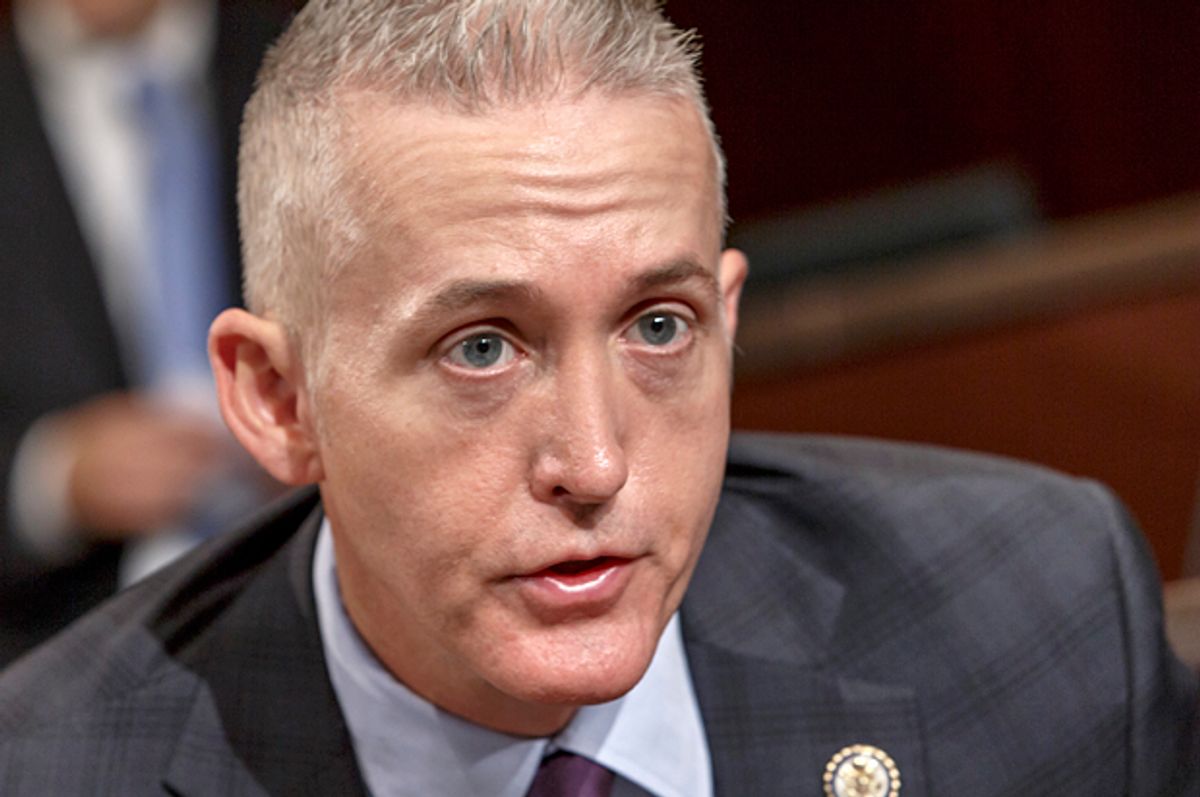The first hearing of the House Select Committee on Benghazi was held Wednesday morning, and for the most part it was a dull affair. The focus of the hearing was on the progress made in implementing recommendations laid out by State Department’s Account Review Board (ARB) report on the attacks. It was a topic suggested by Democratic committee member Rep. Adam Schiff, and while the questioning provided some informative glimpses into how State Department bureaucracy handles security issues at diplomatic facilities, it lacked the bombast and fireworks of previous House Benghazi hearings.
To his credit, this was precisely the sort of hearing that committee chairman, Trey Gowdy, promised us. “There is this notion out there, as some of my colleagues have said, that this will be a circus, a kangaroo court,” Gowdy said back in July. “No one who values their professional reputation wants to be part of that. I don't want to be part of that.”
That’s not to say the hearing wasn’t without its moments of grandstanding and theatrical flourish. Rep. Jim Jordan of Ohio threw himself down a rabbit hole with a long rant challenging the independence of the Accountability Review Board. And when Gowdy got his turn in front of the cameras he slipped back into his familiar pattern of loudly demanding witnesses respond to loaded questions that he knows they can’t actually provide answers to. When State Department Assistant Secretary for Diplomatic Security Gregory Starr testified that he brings his concerns over inadequate security measures directly to Secretary of State John Kerry, Gowdy said: “Was it done on September 10 of 2012? Was it done prior to Benghazi? Because this recommendation has existed for more than 10 years.” “I was not here at that time,” Starr replied. “I’m sorry I cannot tell you.”
But all told, the hearing was very likely a disappointment to the conservatives who believe that a vast Benghazi conspiracy exists and that Trey Gowdy would use his extra-special investigatory skills to unearth the smoking gun evidence that has thus far eluded every other congressional investigation into the matter. On Fox News yesterday afternoon, they were actually complaining that the Republicans on Gowdy’s committee weren’t outraged enough. “They have been beating the drums about this,” Fox News’ Harris Faulkner said. “I was shocked there was so little passion in this.”
Complaining about a lack of “outrage” is a touch ironic given that yesterday’s hearing was on one of the biggest unresolved issues raised by the attacks in Benghazi: the problems in providing security for diplomatic staff. If the State Department can’t adequately protect its personnel, that’s something you can feel justifiably outraged over. It’s certainly far more worthy of intense scrutiny than the editing process for White House talking points and all the other trumped-up controversies that draw the bulk of attention from Republicans and conservatives.
And that’s why, in spite of yesterday’s uneventful hearing, I still strongly doubt that Gowdy will keep a lid on the craziness. Both parties want the issue of diplomatic security addressed, and he’s bought himself a measure of goodwill with Democrats and the press by acting against type and holding a quiet, informative hearing on the State Department’s risk management strategies and best practices. But that’s not what conservatives and Republicans want or expect from the Benghazi select committee, and that’s not what Gowdy promised them.
After the House voted in favor of creating the committee, Gowdy released a statement laying out what he hoped to accomplish:
Why was security for our facility in Libya inadequate, and why were repeated calls for additional security unheeded and, indeed, explicitly rejected? Was our military response during the pendency of the siege sufficient? And in the days and weeks after the attack, was the Obama administration transparent and forthright with our fellow Americans in describing the impetus behind the attack?
Moreover, no one has been arrested, prosecuted, or punished for the murders of our fellow Americans. These outstanding questions, and others, are legitimate, and seeking the answer to these questions should be an apolitical process.
As many frustrated parties have gone to great pains to point out, many of these "outstanding questions" were answered long ago and several times over. And, in the time since that statement was issued, the suspected ringleader of the attacks was captured by U.S. authorities.
When Democrats and other critics of the Republican Benghazi obsession deride the committee as a “witch hunt,” the focus on the already-answered unanswered questions is what they’re talking about. Gowdy himself indicated that he’ll be revisiting these questions soon enough in his opening statement at yesterday’s hearing: “Given the gravity of the issues at hand, I would rather run the risk of answering a question twice than run the risk of not answering it once.”
When he does go down the “unanswered questions” road, the partisan bickering and sideshow antics will very likely start anew. And Gowdy will go down that road because Republicans and conservatives want THE TRUTH. They want proof that Barack Obama made a conscious decision to let Americans die. They want the damning documents that will derail Hillary Clinton’s 2016 ambitions. They want the coverup exposed and all relevant parties impeached.
When they don’t get any of those things, they’ll settle for a little outrage.

Shares